SEARCH BY TITLE
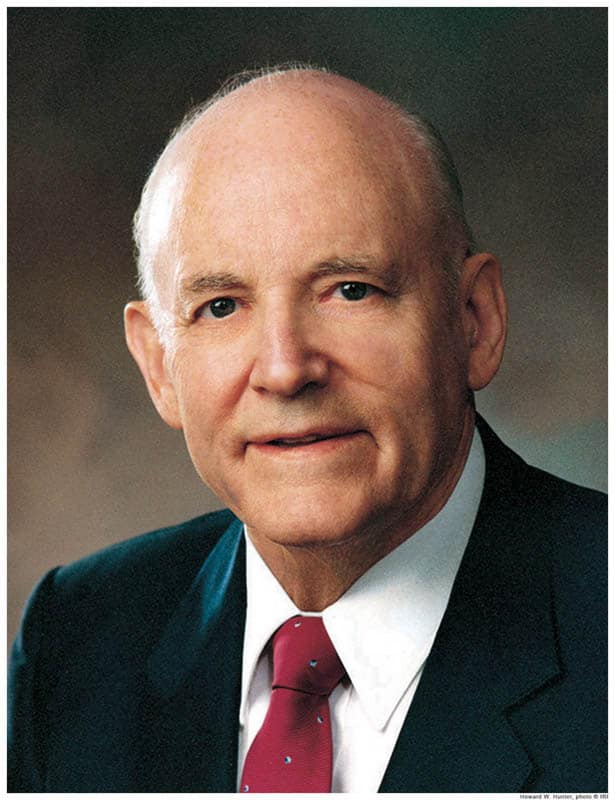 An Anchor to the Souls of Men
An Anchor to the Souls of Men
I am here tonight to tell you that Despair, Doom, and Discouragement are not an acceptable view of life for a Latter-day Saint. However high on the charts they are on the hit parade of contemporary news, we must not walk on our lower lip every time a few difficult moments happen to confront us. I am just a couple of years older than most of you, and in those few extra months I have seen a bit more of life than you have. I want you to know that there have always been some difficulties in mortal life and there always will be. But knowing what we know, and living as we are supposed to live, there really is no place, no excuse, for pessimism and despair. In my lifetime I have seen two world wars plus Korea plus Vietnam and all that you are currently witnessing. I have worked my way through the depression and managed to go to law school while starting a young family at the same time. I have seen stock markets and world economics go crazy and have seen a few despots and tyrants go crazy, all of which causes quite a bit of trouble around the world in the process. So I am frank to say tonight that I hope you won’t believe all the world’s difficulties have been wedged into your decade, or that things have never been worse than they are for you personally, or that they will never get better. I reassure you that things have been worse and they will always get better. They always do—especially when we live and love the gospel of Jesus Christ and give it a chance to flourish in our lives.
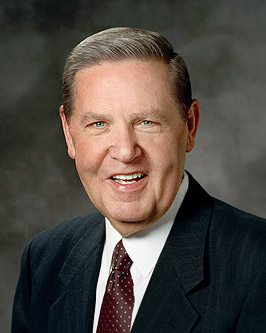 “An High Priest of Good Things to Come”
“An High Priest of Good Things to Come”
My declaration is that this is precisely what the gospel of Jesus Christ offers us, especially in times of need. There is help. There is happiness. There really is light at the end of the tunnel. It is the Light of the World, the Bright and Morning Star, the “light that is endless, that can never be darkened.” It is the very Son of God Himself. In loving praise far beyond Romeo’s reach, we say, “What light through yonder window breaks?” It is the return of hope, and Jesus is the Sun. To any who may be struggling to see that light and find that hope, I say: Hold on. Keep trying. God loves you. Things will improve. Christ comes to you in His “more excellent ministry” with a future of “better promises.” He is your “high priest of good things to come.” I think of newly called missionaries leaving family and friends to face, on occasion, some rejection and some discouragement and, at least in the beginning, a moment or two of homesickness and perhaps a little fear. I think of young mothers and fathers who are faithfully having their families while still in school—or just newly out—trying to make ends meet even as they hope for a brighter financial future someday. At the same time, I think of other parents who would give any earthly possession they own to have a wayward child return. I think of single parents who face all of this but face it alone, having confronted death or divorce, alienation or abandonment, or some other misfortune they had not foreseen in happier days and certainly had not wanted. I think of those who want to be married and aren’t, those who desire to have children and cannot, those who have acquaintances but very few friends, those who are grieving over the death of a loved one or are themselves ill with disease. I think of those who suffer from sin—their own or someone else’s—who need to know there is a way back and that happiness can be restored. I think of the disconsolate and downtrodden who feel life has passed them by, or now wish that it would pass them by. To all of these and so many more, I say: Cling to your faith. Hold on to your hope. “Pray always, and be believing.” Indeed, as Paul wrote of Abraham, he “against [all] hope believed in hope” and “staggered not … through unbelief.” He was “strong in faith” and was “fully persuaded that, what [God] had promised, he was able … to perform.” Even if you cannot always see that silver lining on your clouds, God can, for He is the very source of the light you seek. He does love you, and He knows your fears. He hears your prayers. He is your Heavenly Father, and surely He matches with His own the tears His children shed.
 Be of Good Cheer
Be of Good Cheer
It would be easy to become discouraged and cynical about the future—or even fearful of what might come—if we allowed ourselves to dwell only on that which is wrong in the world and in our lives. Today, however, I’d like us to turn our thoughts and our attitudes away from the troubles around us and to focus instead on our blessings as members of the Church. The Apostle Paul declared, “God hath not given us the spirit of fear; but of power, and of love, and of a sound mind.” None of us makes it through this life without problems and challenges—and sometimes tragedies and misfortunes. After all, in large part we are here to learn and grow from such events in our lives. We know that there are times when we will suffer, when we will grieve, and when we will be saddened. However, we are told, “Adam fell that men might be; and men are, that they might have joy.” How might we have joy in our lives, despite all that we may face? Again from the scriptures: “Wherefore, be of good cheer, and do not fear, for I the Lord am with you, and will stand by you.” The history of the Church in this, the dispensation of the fulness of times, is replete with the experiences of those who have struggled and yet who have remained steadfast and of good cheer as they have made the gospel of Jesus Christ the center of their lives. This attitude is what will pull us through whatever comes our way. It will not remove our troubles from us but rather will enable us to face our challenges, to meet them head on, and to emerge victorious. Too numerous to mention are the examples of all the individuals who have faced difficult circumstances and yet who have persevered and prevailed because their faith in the gospel and in the Savior has given them the strength they have needed. This morning, however, I’d like to share with you three such examples.
 Bourne Upon Eagles Wings
Bourne Upon Eagles Wings
Two weeks ago I met for the first time a man I would like to meet again and know more of. His name is Henry D. Stagg—Don Stagg to his friends. He went to bed in August of 1965 about the way everybody else goes to bed and about the way he had all of his life. The difference came the next morning, when his body awoke and his eyes didn’t. He was blind, frightened, and he was more than that—terrified. He went to the doctor, who said with guarded optimism, “Well, this thing sometimes doesn’t last very long, and it might just be an hour or two.” Well, the hours stretched into days and the days stretched into weeks and the weeks finally became a month. Don Stagg could think only of one thing, and that was suicide. He wanted out. (He hadn’t asked for this kind of body, and he didn’t suppose that he had to go on with it, so he wanted out.) Well, to make a long story short, Don Stagg found, in the midst of his experience, what one of the prisoners found; that is, it takes some love to get from where we are to where we need to be. One evening Mrs. Stagg arranged to slip the children past the hospital security. They shuffled into the room, and Don did not know who was there. He was surly and arrogant almost all of the time, by his own admission, and he didn’t want to talk, but then he felt those little hands on his legs and on his arms. The children said, “Daddy, we love you, and we want you to come home. We don’t want any other daddy.” Don had seen a little light in a dark place, so he went home and started that night to pace off the house. He first paced off the steps from the bedroom to the refrigerator. He says, “It’s one thing to be blind; it’s another thing to starve to death.” When he had the house mastered, he went out into the neighborhood and then up and down the streets for miles away. He decided that he could do quite a little bit, and about two years after the effects of this disease had taken his sight, he enrolled in law school at the University of Utah. In four years he had passed all his courses and the state bar. For one year he worked for the attorney general’s office and now is in private practice. Don Stagg is blind and has some limitations and some bonds put upon him by his own body, but he is doing a great deal. He water-skis and he snow-skis and, just a short time ago, he shot a two-under-par game at the Bonneville Golf Course in Salt Lake City. Now, there are some things he can’t do. He cannot see the daughter who has been born to him since he lost his sight. But he believes he will and he believes that that will not be a limitation upon him and that he will not be bound down by that blindness or by anything else. There’s something in that kind of spirit which seems to break every kind of bond that might ever come in this life or the next.
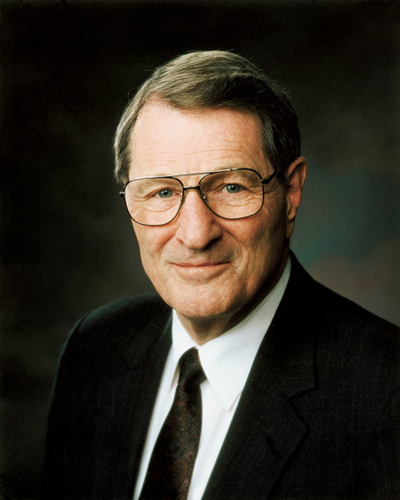 But For a Small Moment
But For a Small Moment
The highest compliment I can pay to you is that God has placed you here and now at this time to serve in his kingdom; so much is about to happen in which you will be involved and concerning which you will have some great influence. It is because you will face some remarkable challenges in your time; it is because the Church has ceased to be in the eyes of men a mere cultural oddity in the Mountain West and is now, therefore, a global church—a light which can no longer be hid; it is because you have a rendezvous with destiny that will involve some soul stretching and some pain that I have chosen to speak to you tonight about the implications of two things we accept sometimes quite casually. These realities are that God loves us and, loving us, has placed us here to cope with challenges which he will place before us. I’m not sure we can always understand the implications of his love, because his love will call us at times to do things we may wonder about, and we may be confronted with circumstances we would rather not face. I believe with all my heart that because God loves us there are some particularized challenges that he will deliver to each of us. He will customize the curriculum for each of us in order to teach us the things we most need to know. He will set before us in life what we need, not always what we like. And this will require us to accept with all our hearts—particularly your generation—the truth that there is divine design in each of our lives and that you have rendezvous to keep, individually and collectively. God knows even now what the future holds for each of us. In one of his revelations these startling words appear, as with so many revelations that are too big, I suppose, for us to manage fully: “In the presence of God, . . . all things . . . are manifest, past, present, and future, and are continually before the Lord”. The future “you” is before him now. He knows what it is he wishes to bring to pass in your life. He knows the kind of remodeling in your life and in mine that he wishes to achieve. Now, this will require us to believe in that divine design and at times to accept the truth which came to Joseph Smith wherein he was reminded that his suffering would.
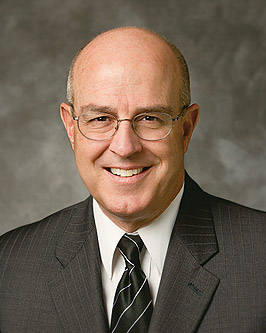 Choose to Believe
Choose to Believe
Every day each of us faces a test. It is the test of our lifetimes: will we choose to believe in Him and allow the light of His gospel to grow within us, or will we refuse to believe and insist on traveling alone in the dark? The Savior provides His gospel as a light to guide those who choose to believe in and follow Him. After the crash, Sailor had a choice. She could have chosen to stay by the airplane in the dark, alone and afraid. But there was a long night ahead, and it was just going to get colder. She chose another way. Sailor climbed up a hill, and there she saw a light on the horizon. Gradually, as she made her way through the night toward the light, it grew brighter. Still, there must have been times when she could not see it. Perhaps it went out of view when she was in a ravine or behind trees or bushes, but she pressed on. Whenever she could see the light, Sailor had evidence that she was on the right path. She did not yet know precisely what that light was, but she kept walking toward it based on what she knew, trusting and hoping that she would see it again if she kept moving in the right direction. By so doing, she may have saved her life. Our lives can be like that too. There may be times when we have been hurt, when we are tired, and when our lives seem dark and cold. There may be times when we cannot see any light on the horizon, and we may feel like giving up. If we are willing to believe, if we desire to believe, if we choose to believe, then the Savior’s teachings and example will show us the pathway forward.
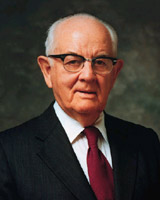 The Davids and the Goliaths
The Davids and the Goliaths
Now, my young brothers, remember that every David has a Goliath to defeat, and every Goliath can be defeated. He may not be a bully who fights with fists or sword or gun. He may not even be flesh and blood. He may not be nine feet tall; he may not be armor-protected, but every boy has his Goliaths. And every boy has his sling, and every boy has access to the brook with its smooth stones. You will meet Goliaths who threaten you. Whether your Goliath is a town bully or is the temptation to steal or to destroy or the temptation to rob or the desire to curse and swear; if your Goliath is the desire to wantonly destroy or the temptation to lust and to sin, or the urge to avoid activity, whatever is your Goliath, he can be slain. But remember, to be the victor, one must follow the path that David followed: “David behaved himself wisely in all his ways; and the Lord was with him.” David had integrity and kept his father’s sheep. David did not leave his sheep without a caretaker when he filled another assignment from his father. David was responsible. His sheep were in his hands; he killed the bear and he killed the lion to save his father’s sheep, even at great danger to himself. He took the little lamb out of the mouth of the beast and restored it to its mother. David took five stones to kill Goliath. He needed only one. David was honorable and had faith in his Heavenly Father, and he feared no man so long as he had the confidence of his Lord. He taunted the Philistine giant, saying, “You come to me with a sword, and with a spear, and with a shield, with a coat of mail, with an armor bearer: But I come to you in the name of the Lord of Hosts, the God of the armies of Israel, whom thou hast defied.” Sometime ago I tore an advertisement from a current magazine. This is what it said: “One time or another we all face adversity’s chilling wind. One man flees from it, and like an unresisting kite falls to the ground. Another yields no retreating inch, and the wind that would destroy him lifts him as readily to the heights. We are not measured by the trials we meet, only by those we overcome.” The pipeline ad read, “Neither rivers, mountains nor ocean waters stop our pipeline crews. What they can’t go through, they go over, under, or around.”
![ArtBook__134_134__EzraTaftBenson____[1]](http://ldsminds.com/wp-content/uploads/2013/10/ArtBook__134_134__EzraTaftBenson____1-e1403389404661.jpg) Do Not Despair
Do Not Despair
We live in an age when, as the Lord foretold, men’s hearts are failing them, not only physically but in spirit. Many are giving up heart for the battle of life. Suicide ranks as a major cause of the deaths to college students. As the showdown between good and evil approaches with its accompanying trials and tribulations, Satan is increasingly striving to overcome the Saints with despair, discouragement, despondency, and depression. Yet, of all people, we as Latter-day Saints should be the most optimistic and the least pessimistic. For while we know that “peace shall be taken from the earth, and the devil shall have power over his own dominion,” we are also assured that “the Lord shall have power over his saints, and shall reign in their midst.” With the assurance that the Church shall remain intact with God directing it through the troubled times ahead, it then becomes our individual responsibility to see that each of us remains faithful to the Church and its teachings. “He that remaineth steadfast and is not overcome, the same shall be saved.” To help us from being overcome by the devil’s designs of despair, discouragement, depression, and despondency, the Lord has provided at least a dozen ways which, if followed, will lift our spirits and send us on our way rejoicing. First, repentance. Second, prayer. Third, service. Fourth, work. Fifth, health. Sixth, reading. Seventh, blessing. Eighth, fasting. Ninth, friends. Tenth, music. Eleventh, endurance. And twelfth, goals.
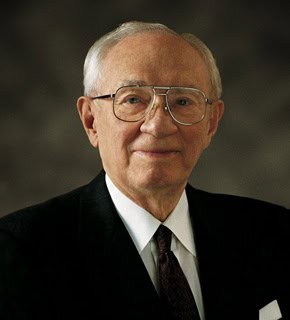 Don’t Drop the Ball
Don’t Drop the Ball
Some of you older men may remember the Rose Bowl football game of 1929, when a player named Roy Riegels recovered a fumble and ran almost the length of the field toward the goal of his opponent. He was tackled and brought down by one of his own team, preventing a touchdown. He had lost his sense of direction in a moment of stress. His mistake cost his team a victory. He was a great player. He lived to be eighty-four, but ever afterward he was remembered as the man who ran the wrong way. This phenomenon is not peculiar to sports. It happens every day in life. There is the student who thinks he is doing well enough, and then under the stress of the final exam, flunks out. There is the driver who all of his life has had a flawless record and then, in a moment of carelessness, is involved in a tragic accident. There is the trusted employee whose performance has been excellent, and then he succumbs to the temptation to steal a little from his employer. A mark is placed upon him which never seems to entirely disappear. There is the life lived with decency—and then comes the destructive, ever-haunting, one-time moral letdown. There is the outburst of anger that suddenly destroys a long-cherished relationship. There is the little sin that somehow grows and eventually leads to separation from the Church. In all of these, someone dropped the ball. He had the self-confidence, possibly even the arrogance, to think that he didn’t really have to try, that he could make it with only half an effort. But the ball passed through his hands and hit the ground, and he gave away the game. Or he thinks he makes a smart catch of someone else’s fumble and runs the wrong way, only to give victory to his opponents. It all points up the need to be constantly alert. It points up the importance of unrelenting self-discipline. It indicates the necessity of constantly building our strength against temptation. It warns us against the misuse of our time, especially our idle time.
 To Heal the Shattering Consequences of Abuse
To Heal the Shattering Consequences of Abuse
Some matters are so sensitive and intensely personal and can awaken such disturbing feelings that they are seldom mentioned publicly. Yet, if tenderly and compassionately treated in the light of truth, discussion of these matters can bring greater understanding, with the easing of pain, the blessing of healing, and even the avoidance of further tragedy. It is with a deep desire to define a path to relief that I speak to you who suffer the shattering consequences of mental, verbal, physical, and especially sexual abuse. I speak also to those of you who cause it. I will focus on sexual abuse, although the counsel given should help the victims of other mistreatment. My intent is to act as a mirror so that divine, healing light can illuminate the dark clouds of distress caused by others’ unrighteous acts. May I be aided to communicate understandably, to provide help, and not further complicate a damaged life. It is also likely that greater understanding, awareness, and sensitivity may permit some of the rest of us to help resolve or prevent the tragedy of abuse in additional victims. The rising tide of this vicious, abominable sin may not have touched your life personally. Yet it is pervasive enough in the world that it may have touched someone you love. It frequently causes such profound suffering— that can be overcome—that I want to speak of how healing can be attained. It will be done reverently, for my objective is to help heal and not aggravate painful memories.
 Meeting Your Goliath
Meeting Your Goliath
Above all else, may we ever remember that we do not go forth alone to battle the Goliaths of our lives. As David declared to Israel, so might we echo the knowledge, “The battle is the Lord’s, and he will give [Goliath] into our hands.” But the battle must be fought. Victory cannot come by default. So it is in the battles of life. Life will never spread itself in an unobstructed view before us. We must anticipate the approaching forks and turnings in the road. We cannot hope to reach our desired journey’s end if we think aimlessly about whether to go east or west. We must make our decisions purposefully. Our most significant opportunities will be found in times of greatest difficulty. The vast, uncharted expanse of the Atlantic Ocean stood as a Goliath between Christopher Columbus and the New World. The hearts of his comrades became faint, their courage dimmed, hopelessness engulfed them; but Columbus prevailed with his watchword, “Westward, ever Westward, sail on, sail on.” Carthage Jail, an angry mob with painted faces, and certain death faced the Prophet Joseph Smith. But from the wellsprings of his abundant faith he calmly met the Goliath of death. “I am going like a lamb to the slaughter,” he had said over a month earlier, “but I am calm as a summer’s morning. I have a conscience void of offense toward God and toward all men.” Gethsemane, Golgotha, intense pain and suffering beyond the comprehension of mortal man stood between Jesus the Master and victory over the grave. Yet he lovingly assured us, “I go to prepare a place for you … that where I am, there ye may be also.” And what is the significance of these accounts? Had there been no ocean, there would have been no Columbus. No jail, no Joseph. No mob, no martyr. No cross, no Christ! Should there be a Goliath in our lives, or a giant called by any other name, we need not “flee” or be “sore afraid” as we go up to battle against him. Rather we can find assurance and receive divine help from Him of whom David wrote in his inspired psalm: “The Lord is my shepherd; I shall not want. … Yea, though I walk through the valley of shadow of death, I will fear no evil: for thou art with me.” Victory will be ours.
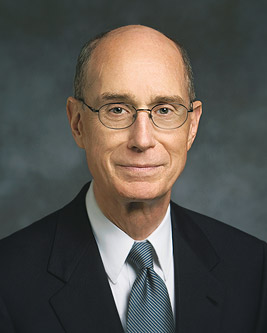 Mountains to Climb
Mountains to Climb
I heard President Spencer W. Kimball, in a session of conference, ask that God would give him mountains to climb. He said: “There are great challenges ahead of us, giant opportunities to be met. I welcome that exciting prospect and feel to say to the Lord, humbly, ‘Give me this mountain,’ give me these challenges.” My heart was stirred, knowing, as I did, some of the challenges and adversity he had already faced. I felt a desire to be more like him, a valiant servant of God. So one night I prayed for a test to prove my courage . . When hard trials come, the faith to endure them well will be there, built as you may now notice but may have not at the time that you acted on the pure love of Christ, serving and forgiving others as the Savior would have done. You built a foundation of faith from loving as the Savior loved and serving for Him. Your faith in Him led to acts of charity that will bring you hope. It is never too late to strengthen the foundation of faith. There is always time. . . If we have faith in Jesus Christ, the hardest as well as the easiest times in life can be a blessing. In all conditions, we can choose the right with the guidance of the Spirit. We have the gospel of Jesus Christ to shape and guide our lives if we choose it. And with prophets revealing to us our place in the plan of salvation, we can live with perfect hope and a feeling of peace. We never need to feel that we are alone or unloved in the Lord’s service because we never are. We can feel the love of God. The Savior has promised angels on our left and our right to bear us up. And He always keeps His word.
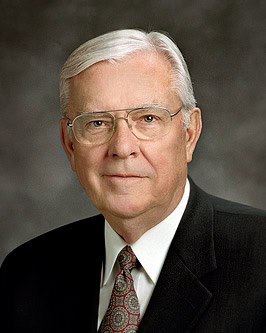 Stay in the Boat and Hold On!
Stay in the Boat and Hold On!
Recently, a friend of mine took his son on a trip down the Colorado River through Cataract Canyon, located in southeastern Utah. The canyon is famous for its 14 miles (23 km) of white-water rapids that can be particularly hazardous. In preparation for their adventure, they had carefully reviewed the National Park Service website, which contains important information about personal preparedness and common, hidden hazards. At the beginning of the trip, one of the experienced river guides reviewed important safety instructions, emphasizing three rules that would ensure the group’s safe travel through the rapids. “Rule number one: stay in the boat! Rule number two: always wear a life jacket! Rule number three: always hold on with both hands!” He then said again, with even more emphasis, “Above all, remember rule number one: stay in the boat!” This adventure reminds me of our mortal journey. Most of us experience periods in our lives where the tranquil waters of life are appreciated. At other times, we encounter white-water rapids that are metaphorically comparable to those found in the 14-mile stretch through Cataract Canyon—challenges that may include physical and mental health issues, the death of a loved one, dashed dreams and hopes, and—for some—even a crisis of faith when faced with life’s problems, questions, and doubts. The Lord in His goodness has provided help, including a boat, essential supplies such as life jackets, and experienced river guides who give guidance and safety instructions to help us make our way down the river of life to our final destination.
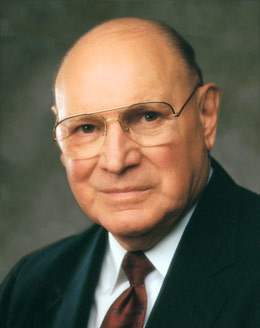 Sunday Will Come
Sunday Will Come
Each of us will have our own Fridays—those days when the universe itself seems shattered and the shards of our world lie littered about us in pieces. We all will experience those broken times when it seems we can never be put together again. We will all have our Fridays. But I testify to you in the name of the One who conquered death—Sunday will come. In the darkness of our sorrow, Sunday will come. No matter our desperation, no matter our grief, Sunday will come. In this life or the next, Sunday will come. I testify to you that the Resurrection is not a fable. We have the personal testimonies of those who saw Him. Thousands in the Old and New Worlds witnessed the risen Savior. They felt the wounds in His hands, feet, and side. They shed tears of unrestrained joy as they embraced Him. After the Resurrection, the disciples became renewed. They traveled throughout the world proclaiming the glorious news of the gospel. Had they chosen, they could have disappeared and returned to their former lives and occupations. In time, their association with Him would have been forgotten. They could have denied the divinity of Christ. Yet they did not. In the face of danger, ridicule, and threat of death, they entered palaces, temples, and synagogues boldly proclaiming Jesus the Christ, the resurrected Son of the living God.
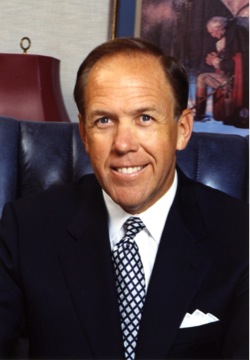 That’s Life (Enduring Well)
That’s Life (Enduring Well)
It is my desire that together we will come to a better understanding of why we are here on earth, and why we face challenges at almost every turn. At the turn of the 20th Century, J. Paul Getty was the richest man in the world. He made a good part of his fortune in the oil business and was one of the great philanthropists of all time. In the twilight of his life he was asked by a young reporter what counsel he would give to young people beginning their careers. His answer was simple and straight-forward. “There are three things to remember,” he said. “First: Get up early. Second: Work hard. And third: Find oil.” I believe this is good counsel for us at the beginning of the 21st Century as well. Getting up early and working hard make sense and are easy to understand. We instinctively know the discipline required to get up and work hard. Finding oil may be a little more difficult. To him, oil was a black, slippery substance which was pumped out of the earth and refined for various energy- related applications. To you and me, finding oil takes on an entirely new dimension. It could mean being successful in your chosen profession, but the real meaning, I think, is much deeper than that. It is finding happiness in friends and family. It is the meaning the Savior talks about in the Parable of the Ten Virgins which many have equated to personal worthiness or individual preparation. . . The Lord has given you much. What you get is inconsequential. What you become makes all the difference. Sometimes we forget that in the pre-mortal life two plans were brought forward. One was the plan of God, the Father, which was to be executed by his son, Jesus Christ. The other was Lucifer’s plan. The Father’s plan was based upon the principle of agency, which meant we would have choices and problems in our life. Lucifer’s plan was based without agency, meaning there would be no challenges. Sometimes we must be reminded that you and I fought alongside the Savior in defense of the Father’s plan. We won! Lucifer and his followers were expelled, and we, as a consequence, were given the opportunity to experience the life that we fought for in the pre-mortal life. The Father’s plan also included the Atonement, which Jesus Christ has purchased for each of us that has lived or will ever live. Our job is to face our challenges, as difficult as they may seem, and endure them well. By doing this the Atonement has meaning in our lives and we will fulfill the Lord’s mission statement to us for immortality and eternal life with God the Father.
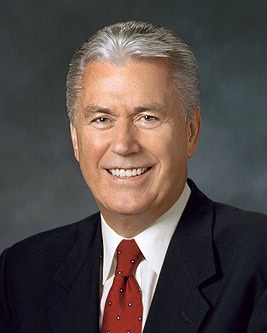 You Can Do It Now!
You Can Do It Now!
We may think that women are more likely than men to have feelings of inadequacy and disappointment—that these feelings affect them more than us. I’m not sure that this is true. Men experience feelings of guilt, depression, and failure. We might pretend these feelings don’t bother us, but they do. We can feel so burdened by our failures and shortcomings that we begin to think we will never be able to succeed. We might even assume that because we have fallen before, falling is our destiny. As one writer put it, “We beat on, boats against the current, borne back ceaselessly into the past.” I have watched men filled with potential and grace disengage from the challenging work of building the kingdom of God because they had failed a time or two. These were men of promise who could have been exceptional priesthood holders and servants of God. But because they stumbled and became discouraged, they withdrew from their priesthood commitments and pursued other but less worthy endeavors. And thus, they go on, living only a shadow of the life they could have led, never rising to the potential that is their birthright. As the poet lamented, these are among those unfortunate souls who “die with [most of] their music [still] in them.” No one likes to fail. And we particularly don’t like it when others—especially those we love—see us fail. We all want to be respected and esteemed. We want to be champions. But we mortals do not become champions without effort and discipline or without making mistakes. Brethren, our destiny is not determined by the number of times we stumble but by the number of times we rise up, dust ourselves off, and move forward.
